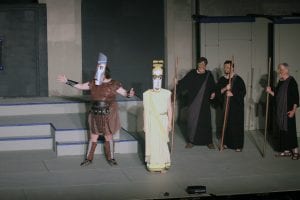Quad-Cities Online Performances Work For Racial Justice
A year ago, Chelsea Ward was sassily standing up to a rigid Mother Superior in Music Guild’s “Sister Act.”

Chelsea Ward
This month, the passionate 25-year-old Davenport actress is standing up for racial justice and equality in two different online performances. On Aug. 8, Ward was among an all-female cast in a virtual cabaret – “Six Queens for Change,” recorded at Moline’s Black Box Theatre – and this Wednesday will play the title role in “Antigone (born against.),” a modern version of the ancient Greek tragedy.
She was asked by Victoria House to help put together the Black Box cabaret, featuring four women of color, which raised money for both the theater and Initiatives of Change, USA — part of a diverse global network with an 80-year track record of peacebuilding, conflict transformation, and forging partnerships across divides of race, class, religion and politics.
They took the name “Six Queens for Change” by getting permission to perform two songs from the new Broadway musical, “Six,” which planned to open March 12 but was shut down by the Covid-19 pandemic.
It’s a British musical by Toby Marlow and Lucy Moss, which premiered in 2017 in Edinburgh — a modern retelling of the lives of the six wives of Henry VIII as a high-tech pop concert. Pleasant Valley High alum Samantha Pauly played Katherine Howard (c. 1524-1542) last year at Chicago Shakespeare Theater, and was due to open on Broadway.
For the Black Box cabaret (filmed without an audience), Ward sang the title song from the musical “Carrie,” based on the Stephen King novel.
“We featured actresses who weren’t really given a chance at roles because of the lack of diversity,” she said recently. “We found songs we all liked and made it happen in about three or four weeks.”
“They were either about empowering women or songs we enjoy doing but would not be considered for that role, based on how we looked or race,” Ward said. “It was doing stuff that was different, to show the sensitivity and diversity, to change some hearts and minds as well.”
You can see it at facebook.com/sixqueensforchange/.

“Six Queens for Change” was a virtual cabaret, premiering on Aug. 8.
“It spoke to all of us in different ways,” Ward said. “We’re all from different racial backgrounds, ethnicities and cultures. It focused on bringing people together.”
“It was fun to be a part of that. Then I got asked to be ‘Antigone’ and a one-off show called ‘Civil,’ so it’s been pretty busy,” Ward said. “It’s virtual, so it’s safer, but it’s still entertainment and getting to scratch that acting itch you know I have.”
She works from home as a budget analyst for the Arsenal-based Joint Munitions Command, and part-time, she counsels minority victims of trauma through the mental health agency Heart and Solutions.
An Alabama native, Ward graduated from Stillman College in Tuscaloosa, Ala., and earned a master’s in psychology at William James College in Newton, Mass., all within four years.
Her acting credits include Rosalia in Music Guild’s “West Side Story,” Gary Coleman in “Avenue Q” and Marie in “Marie and Rosetta” (both at Playcrafters), Lady in Red in “For Colored Girls” (Bridge Collective) and Thea in “Spring Awakening” (Center for Living Arts).
Greek tragedy through prism of Black Lives Matter
Ward also will be doing a virtual reading Wednesday at 7 p.m. for a 2017 version of Sophocles’ “Antigone” (subtitled “born against,” as a literal translation of the Greek name, meaning “against birth or origin”). The original was written over 2,400 years ago.
“This Antigone takes on being a minority and a minority woman in a time period everyone’s trying to tell you how to feel and who to be, what you can and can’t accept; what you can and can’t do,” Ward said of the new adaptation by Griff Bludworth, a 2016 graduate of Cincinnati’s Xavier University.
“It tells you to be who you are, no matter the cost; stand up for yourself no matter the cost,” she said. “That’s definitely something I’ve been trying to do, talking about diversity in theater. We can all do better.”

Griff Bludworth, right, adapted and acted in “Antigone” for Ensemble Theatre Cincinnati in 2017.
“Trying to change the narrative, where you’re casting people based on the talent and skills, and not just their looks,” Ward said. “If we don’t work together, nothing’s gonna get better.”
“It definitely works – she’s against the system she’s born into,” said director Mischa Hooker of Bludworth’s focus on “born against” for Antigone.
In the original play, two brothers (sons of Oedipus) fight — Eteocles, who was defending the city of Thebes, and Polyneices, who was attacking Thebes. Both brothers were killed, and their uncle Creon became king. After performing an elaborate funeral for Eteocles, he forbade the removal of the corpse of Polyneices, condemning it to lie unburied, declaring him to have been a traitor.
Antigone, moved by love for her brother and convinced of the injustice of the command, buried Polyneices secretly. For that she was ordered by Creon to be executed, and in a cave, she hanged herself. Her beloved, Haemon, son of Creon, commits suicide over her dead body.
Creon (to be read by Aaron Sullivan) is “the intransigent ruler and Antigone is the virtuous person who has to go against the law to get what’s right,” Hooker – who teaches in the Department of Classics at Augustana College — said.
The modern version is not an extreme change, but in it, Antigone is not related to Creon, and the sister of Antigone is her best friend in this version and Creon’s daughter. “It makes the contrast between the two groupings more extreme,” Hooker said. “Her isolation is partly due to her identity and race in the story. The way the story unfolds is basically the same.”

Mischa Hooker lectures on the classics at Augustana College.
In this version, the brother who attacks Thebes is a protestor/rioter against the state, and Antigone also enacts civil disobedience to honor his memory. “It’s definitely a modern setting, with a protestor killed by the state in some way,” Hooker said. “It’s not entirely clear how it happens.”
The chorus is comprised of modern participants of protests and police brutality, he said.
Creon represents the government, the strong leader who thinks you need to crack down on protestors with a show of force, Hooker said.
“People who are big fans of Greek tragedy would say it shows the timeless relevance of these situations. What I would say more, given that these stories have cultural cachet in our society, they are really useful tools to see modern situations in a slightly different way,” he said.
“If you see it through this lens of history, you can get a different way of seeing the same thing, that allows you to take it away from the political ideas you bring to it in a modern setting, and see it with a little bit of stepping back,” Hooker said. “It sharpens the contrasts between the two sides. It brings it into new territory, but gives me a different way of talking about modern situations.”
“One of the things about the original, though it’s clear Antigone is in the right, it’s not that the whole thing is good versus evil,” he said. “There is something on the side of law and order. Creon is fundamentally flawed; he’s in the wrong. But the play is not rejecting the idea you have to have a civil society, you have to have law and order to survive. When that’s pushed to that extreme, it tramples on individual rights, kinship, or in this case, race.”

Genesius Guild performed the original “Antigone” in 2016 at Lincoln Park, Rock Island.
“That’s what I like about Greek tragedy – it’s not one person telling you what to think,” Hooker said. “Antigone is the one who should be respected; her brother deserves respect and is the one taken away by the authorities. I’m not saying everything is black and white. A lot of the chorus is coming in with different perspectives.”
“The situation with Black Lives Matter, we can approach it from different perspectives and angles,” he said. “So often, we have our political beliefs set in stone and we don’t really think about things from the ground up. Changing the setting, putting it in a different culture – somehow connected to us – will allow us to see the modern thing with fresh eyes.”
Antigone is a symbol of justice, resistance to oppression. “She’s a stubborn character; she’s proud,” Hooker said. “Sometimes, it spills over into nastiness. That’s how the character behaves in the original, so it’s pretty similar.”
Classical figures become recognizable in this clash of justice against racial discrimination that is both timeless and horrifically timely, according to a 2017 article at broadwayworld.com. “This translation addresses the theme of racial discrimination, an issue that persists in the forefront of our nation’s consciousness and which many people continue to be worried about, are thinking about, and are scared about,” Bludworth said at the time.
During the current resurgence of Black Lives Matter (and worldwide protests over the police killings of George Floyd and Breonna Taylor), “It’s very interesting,” Ward said. “It definitely will speak to people.”
The goal to present theater like this is to stir and support conversation, discussion, trying to understand each other — “no matter what side you’re on is what’s going to make a difference,” she said.
“Change scares people and being different scares people, but you have to work together to remedy that, or else this is gonna be a hot mess forever,” Ward said. “We need to get back to treating people like people, instead of based on their gender, their race or ethnicity.”
The virtual cast includes Anna Schneider, Tristan Odenkirk, Sarah Willie, Andrew Bruning, Dee Canfield, Mattie Gelaude, Denise Yoder and Samuel Langellier. This production contains disturbing thematic elements and strong language, and will include a Q&A discussion to follow on Zoom.
“This was a play that seemed timely, also in our area of interest,” Hooker (an acting veteran of Genesius Guild and Prenzie Players) said. “I knew about it because I taught a class in Greek tragedy in 2017. I had seen things about this in media reports and I contacted the guy who wrote it in Cincinnati.”
The playwright wanted Antigone to be played by a black woman, he noted.
Hooker has been involved in stage productions of Greek tragedies (and other plays) in Lincoln Park, Rock Island, with Genesius Guild; also played roles in two Roman plays of Shakespeare —”Julius Caesar” and “Antony & Cleopatra” — as well as in another, set in ancient Greece (“Timon of Athens”), with the Prenzie Players in Davenport.
Hooker played Creon in Genesius’ “Oedipus Rex,” in 2015. He was not in the 2016 Genesius production of “Antigone.”
To see the Wednesday reading (which is not a benefit), visit facebook.com/events/321041032640186/.









